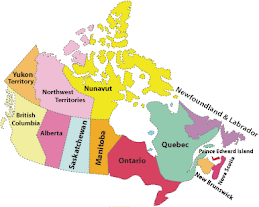Place to Live: The cost of housing in Canada varies in each city and region. Rents and home prices are generally higher in Vancouver and Toronto than in other cities. Housing costs also depend on your location within the city. Initial cost effective choice is renting an apartment. Apartment postings can be found in a number of places, especially if you are wanting to share an apartment. A good place to search for apartments is the local newspaper. Other places to look is Universities, Libraries, and even sometimes Bustops. In some cities such as Toronto, there are special apartment magazines than solely rent apartments, houses, and condos. Also ask friends or colleagues who might be able to help you.
Useful Info for Newcomers: 1
Food and Cooking in Canada may be different from what you were used to in your native country. Like everyone who moves to a new country, you will probably have to make changes in some of the ways you buy, store and cook food. Most Canadians shop for food at large stores called supermarkets. You can also purchase food at smaller grocery stores and specialty shops. In larger cities with well-established immigrant communities, you may find specialty food stores that sell food from your home country. However, some of your traditional foods may not be available in Canada or may be very expensive. List of Supermarkets include: Costco, No Frills, Metro, Loblaws, Price Chopper, Sobeys etc.
Tip: Cooking is always cheaper than buying cooked food
Educated Immigrants are Underemployed: Report
Study: Quality of employment in the Canadian immigrant labour market - complete report here>>
Two-thirds of university-educated recent immigrants to Canada are underemployed in jobs requiring no more than a college education or apprenticeship, according to a new Statistics Canada report. Looking at Canada's immigrant labour market in 2008, found that immigrant wages were lower while involuntary part-time work and temporary employment were more common than among Canadian-born workers. However, after 10 years in Canada, immigrant employment looks similar to that of their Canadian-born counterparts. In all, more than 1.1 million workers aged 25 to 54 with a university degree were under-employed in jobs requiring a college education or apprenticeship last year, and immigrants are 1.5 times more likely to fall into that category than their Canadian-born counterparts. "It's a confirmation of what we see," says Allison Pond, executive director of ACCES Employment Services in Toronto. "The issues still remain. There's a lack of recognition of foreign-trained credentials and access to the labour market; we still are facing barriers. I see it as something we're continuing to work to change." The job landscape is uneven as Canada emerges from the recession, she says, because they see elevated unemployment in some sectors while others — including IT and finance — are experiencing a shortage of skilled workers.
Two-thirds of university-educated recent immigrants to Canada are underemployed in jobs requiring no more than a college education or apprenticeship, according to a new Statistics Canada report. Looking at Canada's immigrant labour market in 2008, found that immigrant wages were lower while involuntary part-time work and temporary employment were more common than among Canadian-born workers. However, after 10 years in Canada, immigrant employment looks similar to that of their Canadian-born counterparts. In all, more than 1.1 million workers aged 25 to 54 with a university degree were under-employed in jobs requiring a college education or apprenticeship last year, and immigrants are 1.5 times more likely to fall into that category than their Canadian-born counterparts. "It's a confirmation of what we see," says Allison Pond, executive director of ACCES Employment Services in Toronto. "The issues still remain. There's a lack of recognition of foreign-trained credentials and access to the labour market; we still are facing barriers. I see it as something we're continuing to work to change." The job landscape is uneven as Canada emerges from the recession, she says, because they see elevated unemployment in some sectors while others — including IT and finance — are experiencing a shortage of skilled workers.
New Canadian Citizenship Guide
A new greatly expanded study guide for Canadian citizenship was launched recently by Citizenship, Immigration and Multiculturalism Minister Jason Kenney. In particular those taking the Citizenship test from March 2010 onwards should study the Citizenship Guide called "Discover Canada". The Rights and Responsibilities of Citizenship covers freedom, democracy, human rights, the rule of law and the equality of men and women. The Canadian Government hopes that the guide will help to promote a greater understanding of Canada's history and values and the importance of institutions such as Parliament. This is the first time that the guide has undergone such an extensive review since it was introduced in 1995. Citizenship Responsibilities Section of the Guide:
DEFENDING CANADA: "There is no compulsory military service in Canada. However, serving in the regular Canadian Forces (navy, army and air force) is a noble way to contribute to Canada and an excellent career choice (www.forces.ca)"
DEFENDING CANADA: "There is no compulsory military service in Canada. However, serving in the regular Canadian Forces (navy, army and air force) is a noble way to contribute to Canada and an excellent career choice (www.forces.ca)"
CTV Report
Canadian television network's headline news, reports, videos, and blogs... This report shows some realities but not both sides of the truth...
Survival Tips: Car buying strategies
Living in North America, especially in Canada, without a car is like walking without one leg. Unless you are living in one of those big cities where street cars, trains, buses and subways are all well connected, you would be quite limited to how fast you could get around town.
Buying a car here can be very tricky. Incentives and rebates have been part of the car-buying landscape for several years. Now, along comes a new twist, "employee discount programs" trumpeting once-in-a-lifetime deals. Is this the real deal? Or just more advertising hype?
The answer isn't a simple yes or no. Instead, we have to say that the employee discount programs seem to offer better deals for more people. What we mean is this: most buyers hate negotiating. Under the employee discount programs, they can get a good deal with less haggling. In most cases, they can look up the price on the Internet before they go near a dealership, and be confident they can get the car for that amount.
Buying a car here can be very tricky. Incentives and rebates have been part of the car-buying landscape for several years. Now, along comes a new twist, "employee discount programs" trumpeting once-in-a-lifetime deals. Is this the real deal? Or just more advertising hype?
The answer isn't a simple yes or no. Instead, we have to say that the employee discount programs seem to offer better deals for more people. What we mean is this: most buyers hate negotiating. Under the employee discount programs, they can get a good deal with less haggling. In most cases, they can look up the price on the Internet before they go near a dealership, and be confident they can get the car for that amount.
Help for Newcomers to get Credentials Recognized
Newcomers to Canada will soon have better access to essential information about how to have their credentials recognized, thanks to support from the Government of Canada. Mr. Mike Wallace, Member of Parliament for Burlington, on behalf of the Honourable Diane Finley, Minister of Human Resources and Skills Development, today announced funding for new projects that will help foreign-trained professionals find the information they need to succeed in their chosen career. "Our long-term economic success as a country depends on allowing all Canadians and all newcomers to Canada to reach their full working potential," said Mr. Wallace. "With these projects, our government is helping to ensure that newcomers have the information they need to get their credentials recognized in Canada." By contributing $655,372 to the Canadian Foundation for Economic Education (CFEE) under the Foreign Credential Recognition Program, the Government of Canada is providing foreign-trained practical nurses, medical radiation technologists, pharmacists and teachers with the information they need to get their credentials recognized in Canada. The organization will receive an additional $508,733 to update and expand the distribution of its Newcomers to Canada DayPlanner.
Interview Questions... Clues
This is an article on typical Canadian Job Interview questions and think about how you would answer them. Read the questions listed, followed by some clue/strategy/suggestions to deal with it.
1. Tell me about yourself?
The most often asked question in interviews. You need to have a short statement prepared in your mind. Be careful that it does not sound rehearsed. Limit it to work-related items unless instructed otherwise. Talk about things you have done and jobs you have held that relate to the position you are interviewing for. Start with the item farthest back and work up to the present.
2. Why did you leave your last job?
Stay positive regardless of the circumstances. Never refer to a majorproblem with management and never speak ill of supervisors, co-workers or the organization. If you do, you will be the one looking bad. Keep smiling and talk about leaving for a positive reason such as an opportunity, a chance to do something special or other forward-looking reasons.
Finding a Family Doctor
By Marilyn Campbell, About.com
Finding a good family doctor can be one of the biggest task, a newcomer might encounter. According to Statistics Canada nearly 10% of Ontarians didn't have a family doctor in 2007, either because they hadn't looked or couldn't find one. Based on the rest of the 2007 Community Health Survey, we're not as bad off as some of Canada, but if you're one of the 559,000 Ontario residents who wanted a doctor but couldn't find one, better-than-average numbers are no comfort. Whether you've moved, your doctor is retiring or you've just never had a long-term physician, the time to start looking for a family doctor is before you need one. Here are some doctor search techniques to get you started:
Decide What's Most Important to You: Before you even begin your search, take the time to think about what you're really looking for in a family physician. Does the doctor's gender matter to you? Is it important they be close to transit, or have parking near the door? Or are you just looking for the doctor who most closely matches your personal health care philosophy, no matter who or where they are? Which raises the question - do you know what your personal health care philosophy is?
Finding temporary work in the GTA
By Marilyn Campbell, About.com
The moment you land in this country or even before that, most of your thoughts might be revolving around finding a job at the earliest. Finding a temp job is a first step in this regard. Many Canadians look at temp work as the additional-income. But temporary employment can also help bridge the gap while you're job hunting, not only by providing income but also by keeping your skills and experience up-to-date. In addition, many Toronto temp agencies provide in-house training on things like computer programs and workplace safety, which can make you more employable overall. For those looking for a career change, short-term contract work will allow you to try out new jobs while you build new skills and gain experience. If you're one of those people who is easily bored and simply likes to change jobs often, having an employment agency looking for your next contract can save you valuable time in-between gigs. Finally of course, there is the opportunity for anyone to pick up extra income by working during their off-hours. So if you're job hunting, changing careers, or just want some extra cash, here are some of the temp agencies in Toronto that can help you reach your goals. Please click on the agency name to go to their respective websites.
Canada's recession to last until Q3 2009
Source: Reuters Canada (reporting by Louise Egan, editing by Jeffrey Hodgson)
Canada's economy will stay in a recession for three quarters and contract 0.5 percent annually in 2009 with the jobless rate peaking at 8.1 percent, the Conference Board of Canada forecast in a report on Wednesday (Jan 14, 2009). Canadian export volumes have been losing steam since late 2007 as the global economy slowed. But until recently the Canadian economy was shielded from the slowdown by high commodity prices. "What is new - and perhaps more devastating - is the impact that lower commodity prices will have on real income in Canada, especially when combined with the effect of waning consumer and investor confidence," the research group said in its outlook for the Canadian economy.
Subscribe to:
Posts (Atom)


